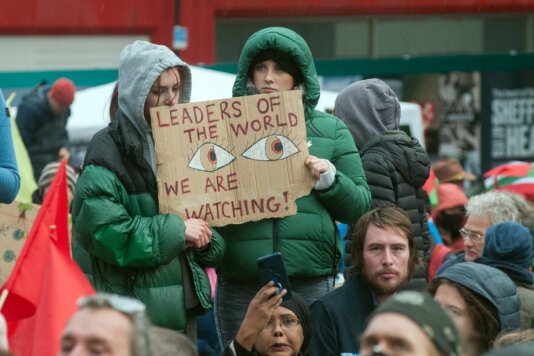- About
- Topics
- Picks
- Audio
- Story
- In-Depth
- Opinion
- News
- Donate
- Signup for our newsletterOur Editors' Best Picks.Send
Read, Debate: Engage.
| topic: | Climate Change |
|---|---|
| tags: | #COP 26, #climate crisis, #activism, #Op Ed |
| located: | Brazil, United Kingdom, China, USA |
| by: | Edo Perry |
Currently, world leaders are discussing our future at COP26 in Glasgow, the largest and most important climate conference held by the United Nations.
Outside the conference gates, a demonstrator on the street held up a sign reading, "History will judge us," wondering whether we will succeed in the task of stopping the climate crisis or bring about our own extinction.
While talking to this demonstrator, who wasn’t able to enter due to conference regulations, an important issue became clear to me: COP26 brings together many people from around the world to discuss climate issues, but also divides society in two by creating a private event that excludes many environmental organisations - NGOs that are the very backbone of the ongoing fight.
But it isn’t not only NGOs that didn't make the cut; climate experts and other activists weren’t invited into the so-called “Blue Zone”, which is the UN-managed space where political parties, delegations and other officials are having the truly important meetings and panel discussions. Thus, many voices were left unheard.
The widening social gaps between leaders, politicians and business representatives and environmental activists became even clearer when around 100,000 people took to the streets of Glasgow in order to protest the event by blocking streets that lead to the climate conference.
The main argument of the protesters, who were led by Greta Thunberg, is that world leaders are not doing enough, or, like Greta likes to say, that they are only talking “blah blah blah” without any real commitment or binding laws to solve the problems.
Speaking of Greta, one of the most distinguished issues you could see in the conference is the lack of female representation, be it among world leaders or representatives of the business sector. This is a huge obstacle in the process of finding solutions for a crisis that, according to UN figures, affects women a lot more than men.
In fact, 80 percent of people displaced by climate change are women. And while the UN has already in the past highlighted the need for gender-sensitive responses to the impacts of climate change, the average representation of women in national and global climate negotiating bodies is below 30 percent.
Another group of people who are deeply affected already by the consequences of climate change are indigenous tribes. Some of them are participating in COP26: a community living in the Amazon rainforest of Brazil, for instance, reported that they are witnessing the damages of human activity such as deforestation, burning up of crops and the loss of the natural world firsthand. The pollution caused in countries like the US or China has already had a direct effect on them.
Furthermore, representatives of the Maldives have explained that their fear of the climate crises is all-too-real, as rising sea levels around the world will very soon make the islands of the Maldives a “fairytale Atlantis” story.
How committed are leaders at COP26 to not letting that happen? The choice of location makes one doubt this commitment.
Experts claim that all the private jets used to fly hundreds of world leaders into Glasgow produce more greenhouse gas emissions from burning fuel than 1,600 Scots would be emitting in a whole year. The better choice would have been to hold the conference in the middle of Europe, so people can reach the event easily by train or other means of public transportation.
Also, the choice of food offered during the conference is problematic. In general, there were very few vegetarian or vegan options available, and most of the dishes served contained meat (the third-most polluting industry worldwide). One would expect that the biggest climate conference in the world would approach this issue sensitively and showcase innovation in this area, but it didn't.
This, in a nutshell, is the problem of COP26, or as the protesters like to call it, the “greenwash climate festival.” The fact that hundreds of delegates of fossil fuel companies, more than any national delegation, were welcomed at the conference added to this impression.
However, the first week of the conference did end with world leaders agreeing to the following three main issues:
According to estimates and models conducted, the decisions that were announced during the conference would prevent global warming of over 1.9 degrees, instead of the 2.7 degrees that were estimated before the conference in Glasgow. With 1.9 degrees we are still in the "Red Zone” for humanity as was described in the IPCC report published by the UN.
At the same time, the conference has made clear that:
And yet, while the world’s nations had managed to quickly cooperate during the COVID-19-pandemic in order to develop a vaccine, we are still far away from finding common solutions for the climate crisis.
To be solved, this issue requires a massive mobilisation of people from various sectors of the economy - from business and governments to organisations and the general public. But most importantly, all voices must be clearly heard, because only together will we succeed.
Edo Perry is an environmental activist, start-up entrepreneur and photographer. He writes about the climate crisis and cleantech innovations.
Image by Tim Dennell
